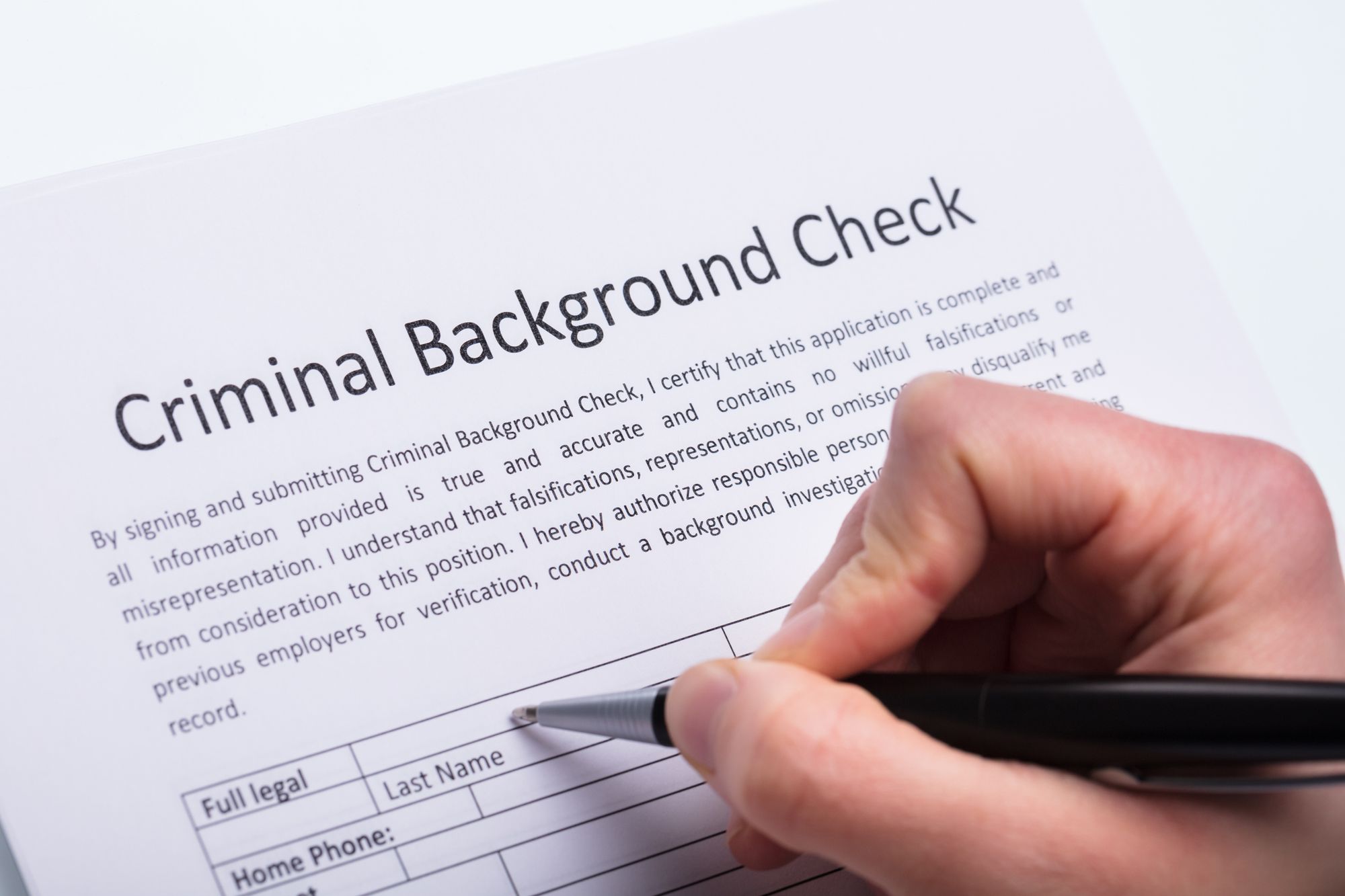Craig Johnson
Can You Pass a Background Check With a Misdemeanor?
The possible consequences of having a misdemeanor on your background report, and how long it stays there.

As if a job search or an apartment hunt weren't stressful enough, you might be advised of a background check requirement. This would be especially concerning to anyone with a criminal conviction. If your record show a misdemeanor, however, that's a lot better than a felony.
Let's explore the consequences of having a misdemeanor on your background report. When will it hardly matter? When could it make all the difference? In this article we will cover:
- Which employers probably run background checks
- What happens when you have a misdemeanor on your record
- Examples of misdemeanors
- How long a misdemeanor stays on your record
- Look up how your state treats misdemeanor records
- Can you erase or hide your misdemeanor?
Passing a Background Check With a Misdemeanor on Your Record
Background checks fall into two categories. The first type is a background report sourced from public records near and far. That's the kind of investigation that PeopleWhiz is famous for. The other kind is an employment background check, which is a specialized use of public and private information to evaluate a job candidate.
View Your Report
With the ease of online background checks came more employers of all types running checks on job candidates, but traditionally, you are most likely to face a background check when seeking employment in the following fields.
- Education: Teachers, administrators, professors
- Home contractors: Electricians, plumbers, construction workers
- Finance: Real estate professionals, accountants, bankers, insurance agents, financial planners
- Civil service: Administration, police officer, corrections officer
Companies conduct background checks on prospective employees and volunteers for many reasons. Often it is for internal security; the job may require handling cash or high-priced merchandise. Some employers have external concerns; they don't want to fill a public-facing position with someone who could get the whole organization in trouble.
The main reasons an employer will require a background check are for avoiding theft, public safety, liability, legal requirements, and customer relations.
When you apply for a job, one step might be for you to review a consent page that notifies you of a possible background search should your candidacy move forward. This is common when you apply for a job in the public sector and is increasingly included as a step in online job applications for private companies too, since it requires no effort for them to show you a screen and make you click OK to continue.

Background checks can be as limited as a verification of your Social Security number or can widen considerably to draw in driving records, credit reports (with prior notice), interviews with people who know you, drug test results, and workers' compensation filings.
What If I Have a Misdemeanor on My Record?
Whether a misdemeanor on your background report hurts your chances of landing a new job, renting your next apartment, or qualifying for a social program has a lot to do with the misdemeanor itself and your competition.
For instance, if you shine in a shallow pool of candidates and your offense was driving 45 miles per hour in a 40 zone, a petty misdemeanor, your chances of passing the background check are good.
But if your offense was shoplifting, don't be surprised when you fail the background check for a high-end retail job. Or if dozens of strong applicants want the same apartment, any misdemeanor on your record may send your application to the reject pile no matter how irrelevant it is to your fitness as a tenant. Sometimes landlords, hiring managers, and other workers tasked with reviewing stacks of background reports are just looking for one red flag to shrink the stack and make their choice easier.
An arrest or conviction record is not an automatic disqualifier for most jobs with the federal government or federal contractors.
"There is no hard and fast rule about restricting employment opportunities based on misdemeanors," says Sam Touhy of San Jose, California. "I work in financial services, which is a very conservative industry when it comes to hiring. Aside from qualifications and fit, we have to make sure employees will be covered under our bond insurance. We wouldn’t be able to hire someone with a felony on his or her record, but I know high-ranking executives in banking that have been convicted of misdemeanors."
Examples of misdemeanors:
- Minor drug offenses, such as possession
- Drunk driving, speeding
- Petty theft, like shoplifting
- Minor/simple assault or battery
- Trespassing
- Vandalism
- Minor sex crimes, including solicitation, prostitution, and indecent exposure
- Resisting arrest
- Some cybercrimes, including stalking or bullying
How Long Does a Misdemeanor Stay on My Record?
Misdemeanors, though defined as minor wrongdoings, are still considered crimes and land on your record automatically. Misdemeanor records generally last two to seven years. That's a lot better than the way many states treat felony records, which can remain in public view anywhere from 20 years (Wisconsin) to forever.
A typical background check won't reveal misdemeanors if they occurred far enough back. In Colorado, five years after a conviction, the record becomes viewable only to officers of the court (prosecutors) and law enforcement. Texas has a "seven-year rule" that shields these records from standard background searches after that time. Every state is different.
How Hard Will It Be to Overcome a Misdemeanor on My Background Report?
Don't panic if you see a question about criminal convictions on an application. Read it carefully. Most organizations are only interested in felony convictions, not misdemeanors. Also, many questionnaires will specify a timeframe, such as convictions in the past five years.
And if you face a particularly rigid employer who is not willing to see you for the candidate you are today, maybe you dodged a bullet. How uptight would they be about everything else? You probably wouldn't have been happy working there.
Hiring managers are just people, and people can be biased. "While it's technically illegal for a company to explicitly deny all applicants with criminal records, many still do, and the laws governing this are seldom enforced," writes the Houston Chronicle. "Some sectors are particularly thorough in their background checks and highly likely to bar many types of convicted offenders from working in them. These include law enforcement, care giving, national security, and education."
“While it's technically illegal for a company to explicitly deny all applicants with criminal records, many still do.”
Although you can't shield yourself from all consequences of your misdemeanor conviction appearing during a background check, you may live in a state where it's illegal for employers to use certain misdemeanors in their hiring decisions. Minor drug possession and traffic violations are examples. Know your rights. If they let slip that one of these misdemeanors is why you're not moving forward in the process, they might have just admitted to breaking the law.
Your State Has a Lot to Do With It
"The definition of misdemeanor is generally consistent across state lines," says the legal advice website GetLegal. "A misdemeanor is more serious than an infraction, which generally refers to a violation of law that carries no penalty other than a fine, such as a traffic violation. But misdemeanors are less serious than felonies."
On the other hand, when it comes to the visibility of your criminal records and what can be done with them, the state you live in makes a big difference. Each state has its own policy for documenting, storing, and displaying the information on a convicted criminal.
Furthermore, states limit the following categories in different ways.
- The kind of criminal records that are viewable to the public
- The records an employer is allowed to search for when considering a job applicant
- The records an employer can view but cannot use in hiring
- How many years a potential employer is allowed to go back
Criminal records are open for anyone to see in Colorado and Texas, to name two states. Minor classes of misdemeanor might not be included. In Texas, any arrest, prosecution, and disposition of the case for someone arrested for a Class B misdemeanor or greater is public record.
Look up your state's treatment of criminal records.
Your state might protect you from discrimination in employment and housing when you have a misdemeanor on your record. Learn how your state handles such matters by looking it up at the Collateral Consequences Resource Center. A drop-down menu in the upper right of the webpage will zoom you to your state.
Online vs. paper records.
In some states it is against the law to deny employment to a person based on court records found online. Chances are the hiring team at the job you want is availing themselves of a quick, convenient online background search like PeopleWhiz, as opposed to getting hardcopy at the county records office. Therefore, technically, the law in some states says that they can't reject you for court records found that way.

Can I Erase or Hide My Misdemeanor?
Now you're talking about sealing a court record, or having it expunged, which usually requires going before a judge with multiple documents and paying a fee. The procedure for sealing court records varies by state.
One alternative to sealing criminal records requires no effort on your part and reaps the same benefit. In several states there has been a push to have older criminal records expunged in bulk so they won't interfere with the housing options and job opportunities of people who have had no run-ins with the law ever since. So-called "record relief acts" seek to balance the public's right to know with a law-abiding person's right to get on with life in our age of instant digital personal histories.
"In just the first six months of 2021, 25 states enacted no fewer than 51 laws authorizing sealing or expungement of criminal records, with another 5 states enrolling 11 bills that await a governor’s signature," reports the advocacy group CCRC.
Such efforts might be under way in your state, and you could benefit.
Hold Your Head Up and Move On
A conviction, even for a misdemeanor, is a criminal record and therefore inescapable. However, the fact that the crime was only a misdemeanor lessons the impact it could have on your life today. Job applications might only ask about felony convictions. Old misdemeanors might have dropped out of public view by now. And sometimes it's against state laws to reject candidates based on low-level convictions.
Our advice is to be honest with prospective employers and landlords if they ask about any criminal convictions. And be prepared to answer questions once they've pulled and reviewed your background report. As we said, hiring managers are just people, and you may be fortunate enough to sit across from a person who understands that nobody's perfect.
Check Your Report



